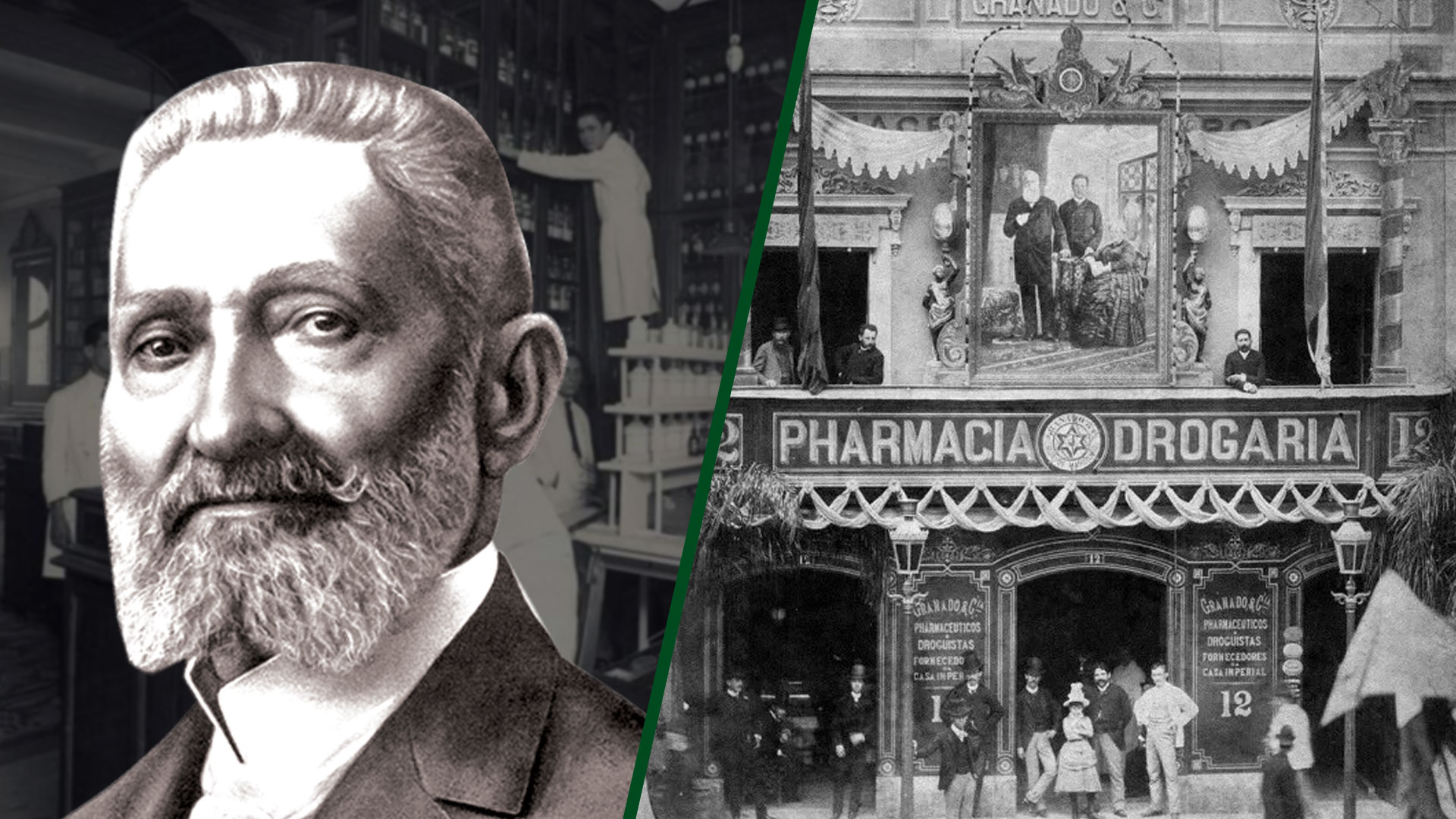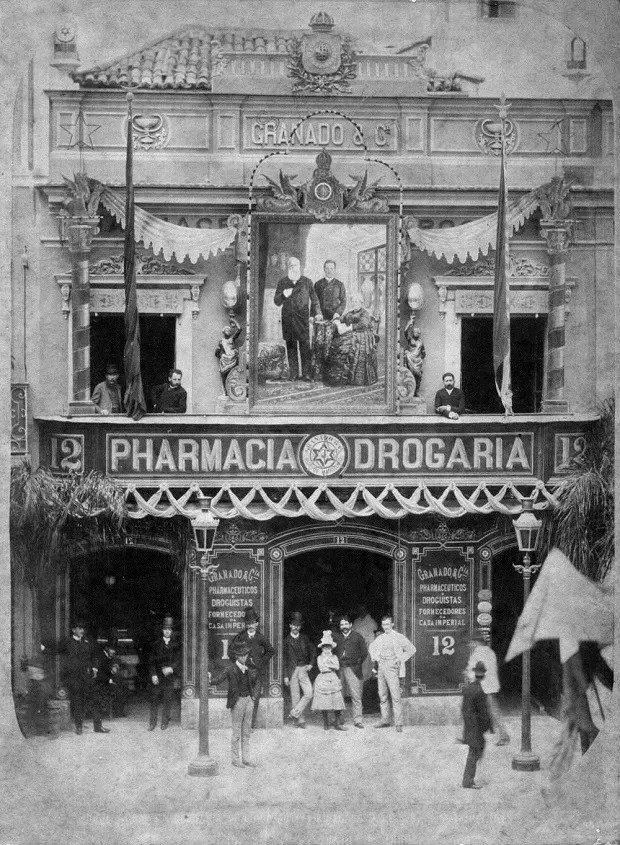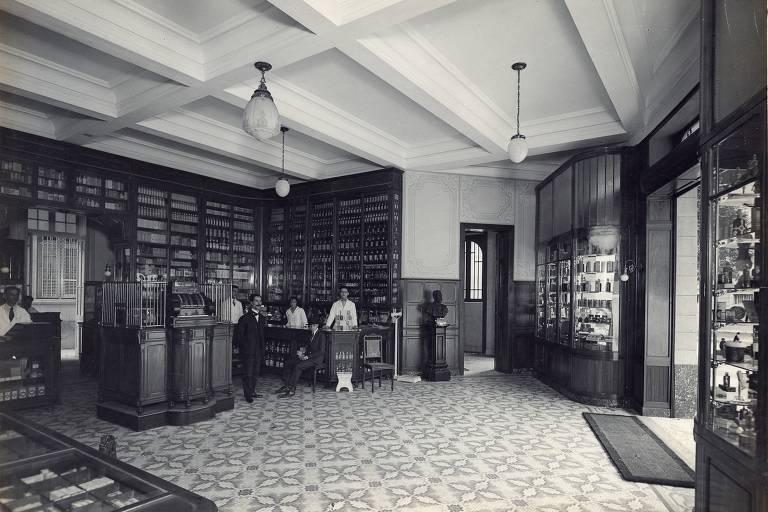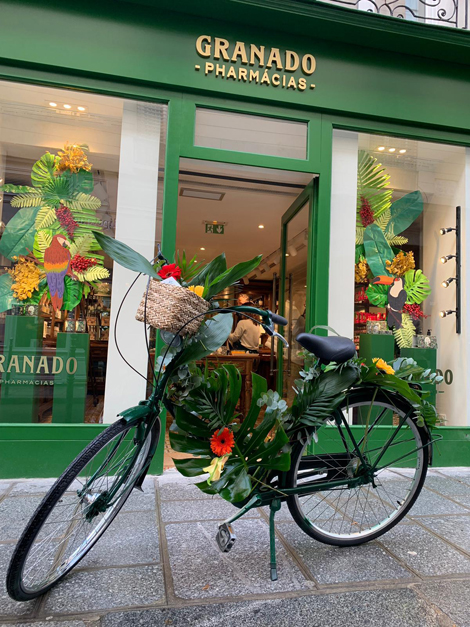The history of Granado, the most traditional apothecary in Brazil, is old and as rich as the raw materials used to compose various moisturizers, soaps, perfumes, and other products. Most likely, you have already used Polvilho Antisséptico, a glycerin soap, or some other item, haven’t you?

Granado was founded in the 19th century by the Portuguese José Antonio Coxito Granado. He arrived in Brazil in 1860 with few belongings and a strong desire to prosper. In an interview on November 12, 1932, for the newspaper A Noite, he summarized the beginning of his life in Rio de Janeiro:
“I arrived in Rio like a Portuguese ready for work—with a small backpack and a strong spirit! […]. The boss provided me with a home, food, and clean clothes. I saved money, and after ten years, when I left there, I had a decent sum!”
Ten years after his arrival in Brazil, on January 6, 1870, José founded Farmácia Granado. Dedicated and using about 300 species of medicinal plants he cultivated himself, José Antonio Coxito Granado manufactured products that competed with or replaced similar ones imported from Europe, adapting them to the needs of those living in Brazil.
The property where José cultivated his herbs and raw materials was known as Ilha da Saúde, a farm in Teresópolis, in the mountainous region of Rio de Janeiro. To celebrate the history of Granado and its 150 years, the perfume Elixir 1870, part of the Vintage line, was created inspired by the herbs and flowers so carefully cultivated on the estate.

Its cologne waters, creams, talc, and rice powder were successful in Rio de Janeiro, and Emperor Dom Pedro II also noted the quality of Granado products. He granted the pharmacy the title of Official Pharmacy of the Brazilian Imperial Family.
With a noticeable growth in the country, after three generations in the Granado family, in 1994, Englishman Christopher John Ogle Freeman acquired and took over the business. A detail that few people know is that in José Antonio Coxito Granado’s will, he made it clear that he wished for the company to be acquired by a foreigner so that the business could conquer the world. Thus, his grandson, Carlos Granado Vieira de Castro, made this happen when he hired Freeman to provide new directions for the business.
Freeman, initially hired to sell, was enchanted by the history and ended up being the buyer they were looking for. In 2004, another highly traditional Brazilian cosmetics brand was incorporated by Freeman—the Phebo brand now also became part of the family, adding more value to the history of Granado.

The first concept store of Granado was inaugurated in 2005 in downtown Rio de Janeiro, at the still-standing first address of the company, opened in 1870. When the modernization of the brand began to be considered, it became clear that the richest asset the company had was its collection, well-preserved by the Granado family during the three generations that managed the brand. The pharmacy features original storefronts, mortars, scales, vintage advertisements, paintings, and some century-old packaging.
The tile floor, the shelves, and the cozy indirect lighting recreate the atmosphere of 19th-century pharmacies. Additionally, a reimagined compounding table at the store entrance showcases new products such as creams, lotions, and soaps. Consumers can also find, in addition to the flagship products, exclusive lines. Today, all Granado stores follow this concept. In 2008, Granado launched its official website, starting online sales.

In 2013, Granado began its internationalization with a special invitation from Le Bon Marché, a department store in Paris, to participate with its products in a week honoring Brazil. The success of the sales led the brand to gain a larger and more visible space, and they remained there for several years. Continuing with this internationalization, in 2016, the company announced a minority sale to the Spanish company Puig, one of the world’s largest perfumery companies. In 2017, the company opened its first concept store in Europe, in Paris, and launched a website to sell in more than 30 countries in the European continent.
The brand currently has several stores in Brazil, two in London, three in Paris, and one each in Lisbon and New York. This text is not sponsored. Granado has been and continues to be a part of Brazil’s history. Additionally, Brazilian History uses and recommends Granado!
Reference: Granado – ‘A BOTICA MAIS TRADICIONAL DO BRASIL”. Brazil, s.d. Site: www.granado.com.br. Available in: Nossa história Granado | Granado Pharmácias. Accessed on: January 17, 2023.
Brasiliana Fotografia – ‘Uma homenagem da Casa Granado ao casal imperial sob as lentes de Marc Ferrez”. Brazil, February 07, 2020. Site: brasilianafotografica.bn.gov.br. Available in: Farmácia Oficial da Família Imperial Brasileira | Brasiliana Fotográfica (bn.gov.br). Accessed on: January 17, 2023.

Matheus Araújo
Matheus Araújo is the founder and editor of Brazilian History. Born in Rio de Janeiro and holding a degree in Advertising and Marketing, his passion for history led him to enroll at the Federal University of the State of Rio de Janeiro, where he is currently pursuing a degree in History Education.
